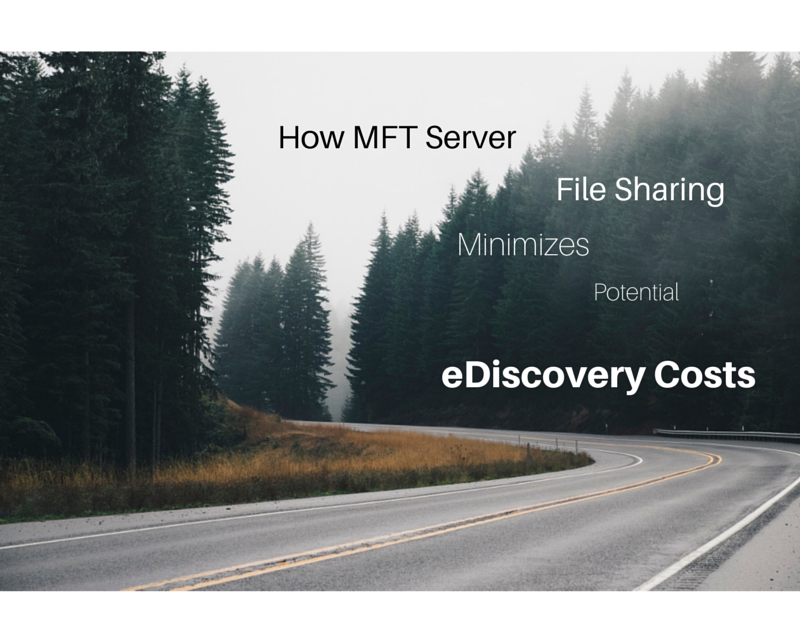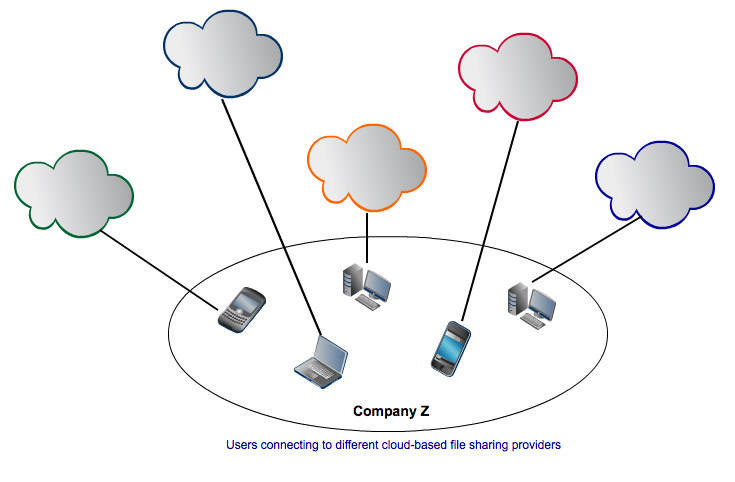How MFT Server File Sharing Minimizes Potential eDiscovery Costs

Overview
E-Discovery can be a very expensive and time-consuming process. Hence, it would be wise to minimize the possible impact of exposure. One way to achieve this is to eliminate activities that result in needless dispersion of electronically stored information (ESI). Incidentally, one such activity exists in the realm of file transfers and that's what we're going to talk about now.

The need to send big files
There will always be instances when your employees will need to send large files. And since email services normally limit file attachments up to 25 MB, your people will start looking for a tool which can satisfy that need. If you can't provide them any, that won't be a problem to them. These days, they can easily find a solution on the Internet - sometimes for free.
Price of cloud based file sharing in light of eDiscovery
Cloud-based file sharing solutions offered under SaaS (Software-as-a-Service) models are now proliferating. Each of them have their own advantages when it comes to file sharing and often come with free versions, so I'm pretty sure your tech-savvy users already have their personal favorites and may even be actively using them.

Initially, the use of these cloud-based solutions can appear to benefit your organization. After all, these tools help in productivity and yet - at least for the free versions - they don't require any investment.
That impression's bound to change the moment you receive a legal hold notice. To comply with the legal hold, first, you'll have to make sure everyone who has been involved in the litigated matter stops using their file sharing accounts.
The importance of this step cannot be overemphasized. If a user continues using an account and that account holds files containing vital evidence, there's going to be a chance that the evidence will be subject to spoliation (intentional or not). That can cost you money either through fines or, worse, through an award in favor of the other party.
After securing all those user accounts hosted by different file sharing providers, you'll have to open each account deemed relevant to the case to find the ESI needed. For tools like DropBox, copies of files can be spread out across numerous devices, so you'll have to gain access to those as well.
Since these devices are managed by the end user, they normally won't have the same level of security as company-managed devices. For example, a typical user won't bother encrypting files on his smartphone or laptop. This can present additional complications like privacy and security issues.
Besides, cloud services themselves are fraught with security deficiencies that can lead to non-compliance to regulations like PCI-DSS, HIPAA, SOX and GLBA, which may expose you to another round of lawsuits if your users are not careful. You wouldn't want to leave regulatory compliance in the hands of end users, would you?
That's not all. Because we're talking about user-managed accounts, you can expect company data to be mixed with personal data. Identifying each account, gaining access to them, and searching relevant ESI among business and personal data can be very laborious and time-consuming.
According to the paper, Accounting for the Costs of Electronic Discovery, which has an extensive discussion on the matter, outsourcing the data collection phase of an eDiscovery process can cost between between $250-$500 per hour or approximately $10,000 for 25GB of data.
What makes it even worse is that, while the legal hold is going on, staff affected by the hold won't be able to carry out certain business-related processes. This can impact their productivity. Thus, the faster you can wrap up an eDiscovery process, the less it will cost you.
Why an MFT Server will cost less
An MFT (Managed File Transfer) Server can minimize your eDiscovery costs because it will enable you to reduce the duration of an eDiscovery process. Here are some of the features in a typical MFT Server that can help in that reduction:
Audit trails
An audit trail or a log can be a big help because it would contain a chronology detailing your users' file transfer activities from which forensic investigators can gather information relevant to the case. Logs can be exported as spreadsheets or other search-friendly file formats that will allow you to perform grouping, sorting, and other methods that can expedite your searches.
Reporting modules
Some of these managed file transfer servers already come with reporting modules that support a variety of searches on the server. Some of these modules allow you to specify specific fields such as a date range, client IP, client port, username, and other criteria and then view them in a more intuitive form.
Regular expressions
There are even managed file transfer servers that support regular expressions, which can significantly boost your searching capabilities. For example, you can use a regular expression to search for strings of text that match the pattern of a social security number or a credit card number. Regular expressions are really very powerful and I encourage you to click that link to learn more about it.
Full administrative control
Right after a legal hold notice arrives, or whenever your legal counsel deems it is time to do so, you can immediately restrict access to specific accounts or shut down the entire server. In other words, you will not be dependent on your end users when the time comes to impose a legal hold. This level of control is necessary if you want to prevent spoliation and preserve crucial evidence.
Best of all, you'll be conducting your searches in a single location (for a single server) which you have total control of.
Summary
You probably wouldn't want to go into settlement just because you couldn't afford the cost of eDiscovery. But many companies have already been forced to do that. If you wouldn't want to be placed in that situation, start eliminating possible areas of exposure. You've identified one just now.
About JSCAPE MFT Server
JSCAPE MFT Server is a platform independent managed file transfer solution that centralizes all of your secure file transfer processes into a single easy to use application. JSCAPE MFT Server supports all major secure file transfer protocols including FTP/S, SFTP, SCP, WebDAV/S, AS2, OFTP and HTTP/S.
Get Started
Would you like to try a free, fully-functional evaluation of JSCAPE MFT Server? Download a copy now.